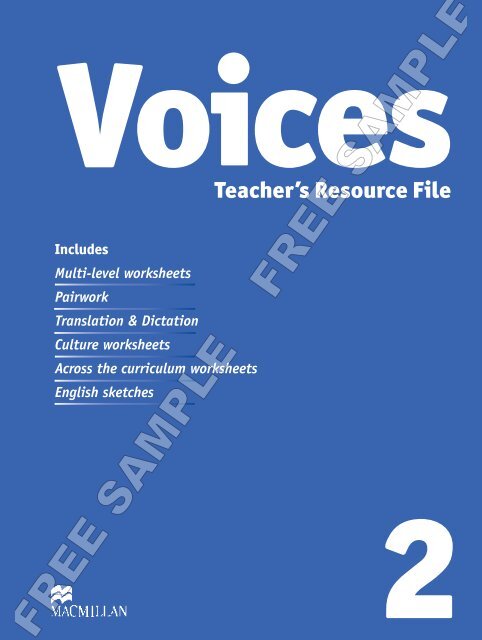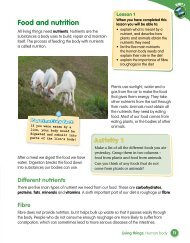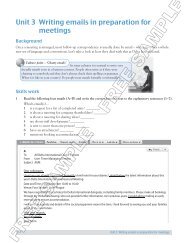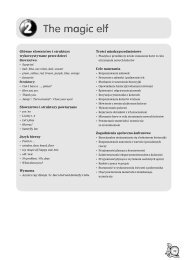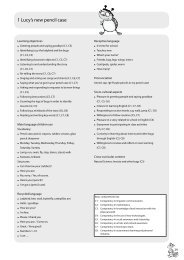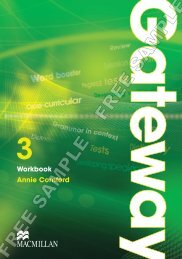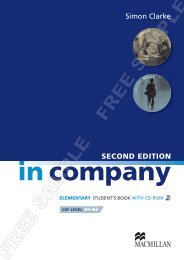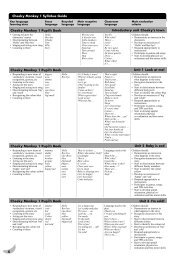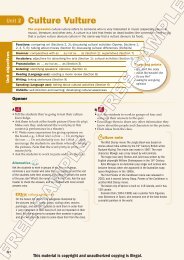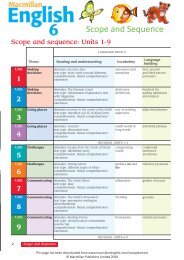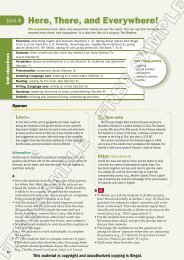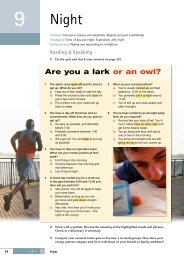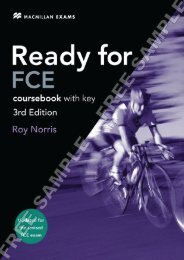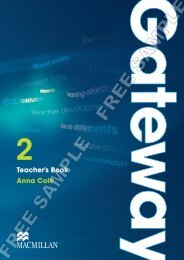Revision - Macmillan
Revision - Macmillan
Revision - Macmillan
Create successful ePaper yourself
Turn your PDF publications into a flip-book with our unique Google optimized e-Paper software.
Includes<br />
Multi-level worksheets<br />
Pairwork<br />
Translation & Dictation<br />
Culture worksheets<br />
Across the curriculum worksheets<br />
English sketches<br />
Teacher’s Resource File<br />
FREE SAMPLE FREE SAMPLE
Contents<br />
Multi-level worksheets<br />
Pairwork<br />
Translation & Dictation<br />
Culture & Across the curriculum<br />
worksheets<br />
English sketches<br />
FREE SAMPLE FREE SAMPLE
Multi-level<br />
worksheets<br />
<strong>Revision</strong> Standard Unit 1.................. 1<br />
<strong>Revision</strong> Extra Unit 1......................... 3<br />
Extension Unit 1................................. 5<br />
<strong>Revision</strong> Standard Unit 2.................. 6<br />
<strong>Revision</strong> Extra Unit 2......................... 8<br />
Extension Unit 2...............................10<br />
<strong>Revision</strong> Standard Unit 3................11<br />
<strong>Revision</strong> Extra Unit 3.......................13<br />
Extension Unit 3...............................15<br />
<strong>Revision</strong> Standard Unit 4................16<br />
<strong>Revision</strong> Extra Unit 4.......................18<br />
Extension Unit 4...............................20<br />
<strong>Revision</strong> Standard Unit 5................21<br />
<strong>Revision</strong> Extra Unit 5.......................23<br />
Extension Unit 5...............................25<br />
<strong>Revision</strong> Standard Unit 6................26<br />
<strong>Revision</strong> Extra Unit 6.......................28<br />
Extension Unit 6...............................30<br />
<strong>Revision</strong> Standard Unit 7................31<br />
<strong>Revision</strong> Extra Unit 7.......................33<br />
Extension Unit 7...............................35<br />
<strong>Revision</strong> Standard Unit 8................36<br />
<strong>Revision</strong> Extra Unit 8.......................38<br />
Extension Unit 8...............................40<br />
<strong>Revision</strong> Standard Unit 9................41<br />
<strong>Revision</strong> Extra Unit 9.......................43<br />
Extension Unit 9...............................45<br />
Answer Key .......................................46<br />
FREE SAMPLE FREE SAMPLE<br />
Multi-level<br />
worksheets
<strong>Revision</strong> Standard Unit 5<br />
Vocabulary<br />
Natural phenomena<br />
1 Look at the pictures and complete the words.<br />
a<br />
e<br />
ts u n a m i<br />
th nd r nd<br />
l ghtn ng<br />
Adverbs<br />
b<br />
f<br />
fl<br />
rthq<br />
d<br />
k<br />
c<br />
g<br />
v l nch<br />
t rn d<br />
2 Complete the sentences with the adverb form of the words in brackets.<br />
a She plays the piano beautifully . (beautiful)<br />
b Please speak<br />
c Always leave the classroom<br />
d Read the instructions<br />
e Joe always eats his lunch<br />
f She did her homework very<br />
g The two friends were chatting<br />
h The car was travelling too<br />
. I can’t understand you. (slow)<br />
. (careful)<br />
. (calm)<br />
. (quick)<br />
. (good)<br />
. (fast)<br />
. (happy)<br />
d<br />
h<br />
h rr c n<br />
w ldf r<br />
FREE SAMPLE FREE SAMPLE<br />
Voices 2 © <strong>Macmillan</strong> Publishers Limited 2011<br />
21<br />
PHOTOCOPIABLE
<strong>Revision</strong> Standard Unit 5<br />
Voices 2 © <strong>Macmillan</strong> Publishers Limited 2011<br />
PHOTOCOPIABLE<br />
22<br />
Grammar<br />
Past continuous: affirmative and negative<br />
3 Look at the picture of last Christmas at a ski resort. Are the sentences true or false<br />
a Four people were snowboarding. T / F b Some people were sitting in the café. T / F<br />
c A boy was eating a hamburger. T / F d A man was reading a newspaper. T / F<br />
e Two girls were drinking cola. T / F f Two people were skiing. T / F<br />
g A boy wasn’t taking a photo. T / F h Two women weren’t chatting, T / F<br />
they were reading books.<br />
4 Correct the false sentences in exercise 3.<br />
1 Two people were snowboarding.<br />
2<br />
3 4<br />
Past continuous: questions and short answers<br />
5 Circle the correct form of the verb in the questions.<br />
a Was / Were the girl drinking cola<br />
c What was / were the man reading<br />
e What was / were the man and the women<br />
doing<br />
b Was / Were the boy eating a salad<br />
d Was / Were people sleeping in the café<br />
f What was / were the boy doing with his<br />
camera<br />
6 Look at the picture again. Match the answers with the correct questions in exercise 5.<br />
e<br />
1 They were reading.<br />
2 He was reading a newspaper.<br />
3 Yes, she was. 4 No, they weren’t.<br />
5 He was taking a photo. 6 No, he wasn’t.<br />
Past simple and past continuous<br />
7 Circle the correct form of the verb in the sentences.<br />
a We went / were going to Italy on holiday last year.<br />
b They had / were having fish for lunch yesterday.<br />
c I had / was having lunch when Tina called.<br />
d I was walking home when it started / was starting to rain.<br />
e People slept / were sleeping when the earthquake happened.<br />
FREE SAMPLE FREE SAMPLE
<strong>Revision</strong> Extra Unit 5<br />
Vocabulary<br />
Natural phenomena<br />
1 Look at the pictures and complete the words.<br />
a<br />
e<br />
t<br />
t<br />
Adverbs<br />
ornado<br />
b<br />
f<br />
w<br />
e<br />
2 Complete the sentences with the correct adverb form of the adjectives in the box.<br />
calm good noisy slow careful bad easy quick<br />
a Come on! Do it quickly . We’re late!<br />
b Please speak<br />
c He plays the piano very<br />
d Read the instructions<br />
c<br />
g<br />
f<br />
a<br />
. I can’t understand when you speak quickly.<br />
. He started when he was six.<br />
before you begin the exercise.<br />
e In an emergency, leave the classroom .<br />
f She’s good at maths and she passed the test very .<br />
g You can do things well or you can do them<br />
h The children are playing<br />
in the garden.<br />
d<br />
h<br />
h<br />
. It’s up to you!<br />
t and<br />
l<br />
FREE SAMPLE FREE SAMPLE<br />
Voices 2 © <strong>Macmillan</strong> Publishers Limited 2011<br />
23<br />
PHOTOCOPIABLE
<strong>Revision</strong> Extra Unit 5<br />
Voices 2 © <strong>Macmillan</strong> Publishers Limited 2011<br />
PHOTOCOPIABLE<br />
24<br />
Grammar<br />
Past continuous: affirmative and negative<br />
3 Make sentences in the past continuous.<br />
a I / watch / my favourite TV programme.<br />
b It / rain / all day.<br />
c He / not do / his homework.<br />
d They / listen to / the news on the radio.<br />
e We / not wait / for them after school.<br />
Past continuous: questions and short answers<br />
I was watching my favourite TV programme.<br />
4 Look at the picture of last summer at the beach. Complete the questions with the past continuous<br />
of the verb in brackets. Then aswer the questions with short answers.<br />
a Was the little boy eating (eat) an ice cream Yes, he was.<br />
b some friends (play) beach football<br />
c the little girl in the water (swim)<br />
d the woman (read) a book<br />
e the boys (windsurf) in the sea<br />
f the man in the sea (wear) sunglasses<br />
Past simple and past continuous<br />
5 Complete the sentences with the correct form of the verb in brackets.<br />
a When the boss arrived, Andy was listening to (listen to) the radio.<br />
b They were dancing when the music suddenly<br />
c Charlie broke his leg while he<br />
d We were sleeping when the earthquake<br />
(play) football.<br />
(stop).<br />
(happen).<br />
e She<br />
(have) an accident while she (drive) home.<br />
f We<br />
(do) our homework when the storm (come).<br />
g I<br />
(swim) in the sea when I (hear) someone shouting.<br />
FREE SAMPLE FREE SAMPLE
Extension Unit 5<br />
Reading<br />
1 Read the text and circle the correct alternatives.<br />
The Day after Tomorrow (2004) (a) was / were an American film directed by Roland Emmerich.<br />
The story (b) was / were about a climatologist, Dr Hall, played by Dennis Quaid.<br />
Dr Hall (c) found / was finding evidence of a new Ice Age and he (d) presented / was presenting<br />
his evidence to a conference on global warming. He said a new Ice Age could happen again<br />
in 100 to 1,000 years from now. At the conference he (e) met / was meeting a Scottish<br />
professor who (f) tells / told him the temperature of the world’s oceans (g) fell / was falling<br />
rapidly. Then the world’s climate (h) changed / was changing suddenly! The new Ice Age (i)<br />
begin / was beginning much sooner than everyone thought. Dr Hall ( j) met / was meeting<br />
the President of the United States. He told him that everyone must go south to Mexico<br />
immediately. There (k) was / were only a few days to save the world! Then he (l) received /<br />
was receiving a telephone call from his son, Jack. Jack (m) is / was in New York where the<br />
weather (n) got / was getting very bad ...<br />
2 Read the text again and answer the questions. Write full answers.<br />
a Who directed the film<br />
b When was it released<br />
c Who played the part of the main character<br />
d What suddenly happened for the new Ice Age to begin sooner than Dr Hall thought<br />
e How much time was there to save the world<br />
Writing<br />
3 Think about a film you saw recently and answer the questions. Use short answers.<br />
a What was the film called<br />
b Who was the director and when was it released<br />
c Who were the main actors<br />
d What happened in the film<br />
e Did you like it Why / Why not<br />
4 Write about the film in exercise 3 using full sentences. Use the text in exercise 1 as a model.<br />
FREE SAMPLE FREE SAMPLE<br />
Voices 2 © <strong>Macmillan</strong> Publishers Limited 2011<br />
25<br />
PHOTOCOPIABLE
Answer Key<br />
Voices 2 © <strong>Macmillan</strong> Publishers Limited 2011<br />
PHOTOCOPIABLE<br />
50<br />
3 Students’ own answers<br />
4 Students’ own answers<br />
Unit 5 <strong>Revision</strong><br />
Standard<br />
1 a tsunami<br />
b earthquake<br />
c avalanche<br />
d hurricane<br />
e thunder and lightning<br />
f flood<br />
g tornado<br />
h wildfire<br />
2 a beautifully<br />
b slowly<br />
c calmly<br />
d carefully<br />
e quickly<br />
f well<br />
g happily<br />
h fast<br />
3 a F<br />
b T<br />
c T<br />
d T<br />
e F<br />
f F<br />
g F<br />
h T<br />
4 1 Two people were<br />
snowboarding.<br />
2 One girl was drinking<br />
cola.<br />
3 Four people were skiing.<br />
4 A boy was taking a photo.<br />
5 a Was<br />
b Was<br />
c was<br />
d Were<br />
e were<br />
f was<br />
6 1 e<br />
2 c<br />
3 a<br />
4 d<br />
5 f<br />
6 b<br />
7 a went<br />
b had<br />
c was having<br />
d started<br />
e were sleeping<br />
Unit 5 <strong>Revision</strong><br />
Extra<br />
1 a tornado<br />
b wildfire<br />
c flood<br />
d hurricane<br />
e tsunami<br />
f earthquake<br />
g avalanche<br />
h thunder and lightning<br />
2 a quickly<br />
b slowly<br />
c well<br />
d carefully<br />
e calmly<br />
f easily<br />
g badly<br />
h noisily<br />
3 a I was watching my<br />
favourite TV programme.<br />
b It was raining all day.<br />
c He wasn’t doing his<br />
homework.<br />
d They were listening to the<br />
news on the radio.<br />
e We weren’t waiting for<br />
them after school.<br />
4 a Was, eating<br />
Yes, he was.<br />
b Were, playing<br />
No, they weren’t.<br />
c Was, swimming<br />
Yes, she was.<br />
d Was, reading<br />
No, she wasn’t.<br />
e Were, windsurfing<br />
Yes, they were.<br />
f Was, wearing<br />
Yes, he was.<br />
5 a was listening to<br />
b stopped<br />
c was playing<br />
d happened<br />
e had, was driving<br />
f were doing, came<br />
g was swimming, heard<br />
Unit 5 Extension<br />
1 a was<br />
b was<br />
c found<br />
d presented<br />
e met<br />
f told<br />
g was falling<br />
h changed<br />
i was beginning<br />
j met<br />
k were<br />
l received<br />
m was<br />
n was getting<br />
2 a Roland Emmerich directed<br />
the film.<br />
b It was released in 2004.<br />
c Dennis Quaid played the<br />
part of the main character.<br />
d The world’s climate<br />
changed suddenly.<br />
e There were only a few<br />
days to save the world.<br />
3 Students’ own answers<br />
4 Students’ own answers<br />
FREE SAMPLE FREE SAMPLE
Pairwork<br />
Worksheet 1A............................................... 1<br />
Worksheet 1B............................................... 2<br />
Worksheet 2A............................................... 3<br />
Worksheet 2B............................................... 4<br />
Worksheet 3A............................................... 5<br />
Worksheet 3B............................................... 6<br />
Worksheet 4A............................................... 7<br />
Worksheet 4B............................................... 8<br />
Worksheet 5A............................................... 9<br />
Worksheet 5B.............................................10<br />
Worksheet 6A.............................................11<br />
Worksheet 6B.............................................12<br />
Worksheet 7A.............................................13<br />
Worksheet 7B.............................................14<br />
Worksheet 8A.............................................15<br />
Worksheet 8B.............................................16<br />
Worksheet 9A.............................................17<br />
Worksheet 9B.............................................18<br />
Worksheets 1A & 1B Teacher’s Notes ....19<br />
Worksheets 2A & 2B Teacher’s Notes ....20<br />
Worksheets 3A & 3B Teacher’s Notes ....21<br />
Worksheets 4A & 4B Teacher’s Notes ....22<br />
Worksheets 5A & 5B Teacher’s Notes ....23<br />
Worksheets 6A & 6B Teacher’s Notes ....24<br />
Worksheets 7A & 7B Teacher’s Notes ....25<br />
Worksheets 8A & 8B Teacher’s Notes ....26<br />
Worksheets 9A & 9B Teacher’s Notes ....27<br />
FREE SAMPLE FREE SAMPLE<br />
Pairwork
Pairwork<br />
Student A<br />
1 Look at the picture. Imagine that you saw all these events yesterday. Then prepare to describe it to<br />
a partner, using past tenses. For example, There was a tornado. There were two cats in a tree.<br />
2 Student B is going to draw your picture. Describe it and answer your partner’s questions, giving as<br />
much detail as possible.<br />
3 Listen to your partner’s description and draw the picture. When Student B finishes, ask questions<br />
to help make your picture perfect.<br />
4 Compare your picture with your partner’s worksheet.<br />
Worksheet 5A<br />
FREE SAMPLE FREE SAMPLE<br />
Voices 2 © <strong>Macmillan</strong> Publishers Limited 2011<br />
9<br />
PHOTOCOPIABLE
Pairwork<br />
Voices 2 © <strong>Macmillan</strong> Publishers Limited 2011<br />
PHOTOCOPIABLE<br />
10<br />
Student B<br />
Worksheet 5B<br />
1 Look at the picture. Imagine that you saw all these events yesterday. Then prepare to describe it<br />
to a partner, using past tenses. For example, There were two children. They were telling people<br />
about the tsunami.<br />
2 Listen to your partner’s description and draw the picture. When Student A finishes, ask questions<br />
to help make your picture perfect.<br />
3 Compare your picture with your partner’s worksheet.<br />
4 Student A is going to draw your picture. Describe it and answer your partner’s questions, giving as<br />
much detail as possible.<br />
FREE SAMPLE FREE SAMPLE
Pairwork 5A & 5B<br />
Language<br />
there was / there were<br />
Prepositions of place<br />
Past continuous<br />
Student’s Book reference<br />
Pages 60–71<br />
Instructions<br />
1 Divide the class in half and give one half worksheet 5A and one half worksheet 5B.<br />
2 Ask students to look at their picture carefully, and write notes about what they can see.<br />
3 Put students in pairs so that one student has worksheet 5A and the other has worksheet 5B. Tell<br />
students they are going to describe their picture so that their partner can draw it. Ask Student<br />
A to begin describing and Student B to draw. Tell them to imagine they saw the scene and ask<br />
them to use the past continuous and there was / there were appropriately.<br />
4 When Student A finishes describing, encourage Student B to ask questions for more information<br />
e.g. Were there any animals Where was the old man; on the left or on the right<br />
5 Students reverse roles so that Student B describes and Student A draws.<br />
6 Ask students to compare their drawings with the original.<br />
Answers<br />
See pictures<br />
Optional activities<br />
1 Use the pictures as a memory game. Ask students to look at and memorize their partner’s picture<br />
for one minute. Then one student looks at the picture and asks questions, e.g. How many trees<br />
were there and their partner answers from memory. Then students change roles and use the<br />
other picture.<br />
2 Ask students to write a description of their partner’s picture from memory.<br />
Teacher’s Notes<br />
FREE SAMPLE FREE SAMPLE<br />
Voices 2 © <strong>Macmillan</strong> Publishers Limited 2011<br />
23<br />
PHOTOCOPIABLE
Translation<br />
& Dictation<br />
Translation<br />
Worksheet 1.................................1<br />
Worksheet 2...........................2<br />
Worksheet 3...........................3<br />
Worksheet 4...........................4<br />
Worksheet 5...........................5<br />
Worksheet 6...........................6<br />
Worksheet 7...........................7<br />
Worksheet 8...........................8<br />
Worksheet 9...........................9<br />
Dictation<br />
Worksheet 1.........................10<br />
Worksheet 2.........................11<br />
Worksheet 3.........................12<br />
Worksheet 4.........................13<br />
Worksheet 5.........................14<br />
Worksheet 6.........................15<br />
Worksheet 7.........................16<br />
Worksheet 8.............................. 17<br />
Worksheet 9.............................. 18<br />
FREE SAMPLE FREE SAMPLE<br />
Translation<br />
& Dictation
Translation Worksheet 5<br />
1 Past continuous: affirmative and negative<br />
a It was raining hard, but the wind wasn’t blowing.<br />
b I was waiting for a train at midnight yesterday.<br />
c We weren’t laughing at you, I promise!<br />
d He wasn’t expecting their visit.<br />
e The people were running away from the flood.<br />
f The helicopter was searching for the swimmers.<br />
2 Past continuous: questions and short answers<br />
a Was your sister working last night Yes, she was.<br />
b Who was eating noisily<br />
c Why were you taking a photo of the tornado<br />
d Were they having lunch at that time No, they weren’t.<br />
e What was he thinking about<br />
f Was I talking in my sleep Yes, you were!<br />
3 Past simple and past continuous<br />
a What were you listening to when I arrived<br />
b I was skiing when the avalanche started.<br />
c They weren’t feeling very well when I saw them.<br />
d They were shouting angrily when he walked in.<br />
e She fell asleep while she was driving.<br />
f The storm started while they were fishing at the lake.<br />
g He wasn’t listening when his teacher told them what to do for homework.<br />
4 <strong>Revision</strong><br />
When I was little I hated thunder and lightning. One day I was at home with my mother and my<br />
sister, and a storm started. My mother decided to make a cake and we forgot about the weather.<br />
While we were helping my mother in the kitchen, lightning struck the house and the lights went<br />
off. We sat on the kitchen floor and my mother sang to us. When my father came home, we were<br />
sitting on the floor, singing Beatles’ songs and eating cake. Now, I love storms and I often go for<br />
walks in the rain.<br />
FREE SAMPLE FREE SAMPLE<br />
Voices 2 © <strong>Macmillan</strong> Publishers Limited 2011<br />
5<br />
PHOTOCOPIABLE
Dictation Worksheet 5<br />
Voices 2 © <strong>Macmillan</strong> Publishers Limited 2011<br />
PHOTOCOPIABLE<br />
14<br />
1 21 Past continuous: affirmative<br />
a I was running in the park yesterday morning.<br />
b Our team was playing a match at ten o’clock.<br />
c They were talking noisily!<br />
d They were studying the tsunami in geography last week.<br />
e It was snowing here last week!<br />
2 22 Past continuous: negative<br />
a I wasn’t carrying an umbrella.<br />
b They weren’t playing football.<br />
c They weren’t waiting for you.<br />
d You weren’t looking!<br />
e He wasn’t helping us.<br />
3 23 Past continuous: questions and short answers<br />
a ‘Were you listening’ ‘No, I wasn’t. Sorry.’<br />
b What was he writing about<br />
c ‘Was she wearing her new uniform’ ‘Yes, she was.’<br />
d ‘Were you driving fast’ ‘No, we weren’t. We were driving carefully.’<br />
e What were you doing before the earthquake<br />
4 24 Past simple and past continuous<br />
a We were walking near the river when lightning struck.<br />
b While they were performing the guitarist fell over.<br />
c I was eating my breakfast when I saw the news.<br />
d The volcano erupted while he was visiting the island.<br />
e While I was watching a horror film on TV, I heard a noise upstairs.<br />
5 25 <strong>Revision</strong><br />
We were sleeping when the earthquake happened. It was a small earthquake and my parents and I<br />
didn’t wake up, but my brother was awake. He was going to the bathroom for some water when he<br />
fell. He hit his head on the door. He thought he was dreaming and he went back to bed. The next<br />
morning, we didn’t believe his story, but then we saw the news on the television while we were<br />
having breakfast.<br />
FREE SAMPLE FREE SAMPLE
Culture &<br />
Across the<br />
curriculum<br />
worksheets<br />
Culture<br />
Worksheet 1................................... 1<br />
Teacher’s Notes 1............................ 2<br />
Worksheet 2................................... 3<br />
Teacher’s Notes 2............................ 4<br />
Worksheet 3................................... 5<br />
Teacher’s Notes 3............................ 6<br />
Worksheet 4................................... 7<br />
Teacher’s Notes 4............................ 8<br />
Worksheet 5................................... 9<br />
Teacher’s Notes 5.......................... 10<br />
Worksheet 6................................. 11<br />
Teacher’s Notes 6.......................... 12<br />
Worksheet 7................................. 13<br />
Teacher’s Notes 7.......................... 14<br />
Worksheet 8................................. 15<br />
Teacher’s Notes 8.......................... 16<br />
Worksheet 9................................. 17<br />
Teacher’s Notes 9.......................... 18<br />
Across the curriculum<br />
Music, Worksheet 1....................... 19<br />
Music, Teacher’s Notes 1................ 20<br />
History, Worksheet 2..................... 21<br />
History, Teacher’s Notes 2.............. 22<br />
History, Worksheet 3..................... 23<br />
History, Teacher’s Notes 3.............. 24<br />
Literature, Worksheet 4................. 25<br />
Literature, Teacher’s Notes 4.......... 26<br />
Geography, Worksheet 5................ 27<br />
Geography, Teacher’s Notes 5......... 28<br />
ICT, Worksheet 6........................... 29<br />
ICT, Teacher’s Notes 6.................... 30<br />
Science, Worksheet 7..................... 31<br />
Science, Teacher’s Notes 7............. 32<br />
Science, Worksheet 8..................... 33<br />
Science, Teacher’s Notes 8............. 34<br />
Literature, Worksheet 9................. 35<br />
Literature, Teacher’s Notes 9.......... 36<br />
FREE SAMPLE FREE SAMPLE<br />
Culture & Across<br />
the curriculum
Culture The USA Worksheet 5<br />
1 Find these things on the USA culture page.<br />
a five types of building<br />
b five cities<br />
c five fruits or vegetables<br />
d four verbs related to cooking<br />
2 Find these events and put them in the correct chronological order.<br />
a The first subway system started.<br />
b Coca-Cola® first appeared in shops.<br />
c The first students went to Harvard.<br />
d The first bank in the USA opened.<br />
e Chicago’s first skyscraper was built.<br />
f Americans could buy their first stamps.<br />
3 Match the words to make phrases and then find them on the USA culture page.<br />
a pork<br />
b bread<br />
c deep-dish<br />
d pizza<br />
e cream<br />
1 pizza<br />
2 cheese<br />
3 toppings<br />
4 rolls<br />
5 ribs<br />
4 Read the text about Food in the USA. Are the sentences true or false<br />
a Chicago is famous for a type of hot dog.<br />
b Food in Chicago often has ketchup on it.<br />
c Bagels are originally from the USA.<br />
d Bagels are made from flour and sugar.<br />
e Meat is cooked slowly at a Kansas barbecue.<br />
f Green chiles are often used in New Mexico.<br />
5 Find words on the page for each of these definitions.<br />
a the opposite of thin .<br />
b ingredients you put on a pizza .<br />
c very important .<br />
d bread before you cook it .<br />
e a large variety .<br />
FREE SAMPLE FREE SAMPLE<br />
T / F<br />
T / F<br />
T / F<br />
T / F<br />
T / F<br />
T / F<br />
Voices 2 © <strong>Macmillan</strong> Publishers Limited 2011<br />
9<br />
PHOTOCOPIABLE
Voices 2 © <strong>Macmillan</strong> Publishers Limited 2011<br />
PHOTOCOPIABLE<br />
10<br />
Culture The USA Teacher’s Notes 5<br />
Aim To learn about aspects of American culture, focusing on the food. Students use Workbook<br />
page 129 followed by worksheet 5.<br />
Warm up<br />
• In pairs, give students two minutes to write down as many types of food and drink associated<br />
with the USA as they can think of.<br />
• Check their ideas. Ask them to look at page 129 and tell you if any of their ideas are there.<br />
Workbook<br />
1 Ask students to read the Check it out! box and the Facts & Figures. Ask what information about<br />
the USA is new for them.<br />
2 Ask students to read all the texts on the page and answer the Test your memory! questions.<br />
Test your memory! answers: 1782; Europe; very slowly, partly smoking it<br />
3 Hand out copies of worksheet 5. Ask students to complete exercises 1 to 3 from memory,<br />
without looking at the page.<br />
4 In pairs, ask students to compare their answers then allow them to read the page again to check<br />
answers.<br />
5 Exercises 4 and 5 could be done in class if there is time or set for homework. Fast finishers can be<br />
asked to add two to four definitions to exercise 5 for a partner to solve.<br />
6 Check the answers with the class.<br />
Web quest<br />
Ask students if they know the answer to the question in the Web quest box. If the students have<br />
computer access to the internet, ask them to follow the web link and find out about the languages<br />
given.<br />
Web quest answer: English 210 million, Spanish 22.4 million, French 1 million, Russian 334,615,<br />
German 90,000<br />
Worksheet Answer Key<br />
1 a bank, college, skyscraper, shops,<br />
restaurants<br />
b Chicago, Boston, New York City, Kansas<br />
City, Albuquerque<br />
c onions, tomatoes, lettuce, peppers, green<br />
chiles<br />
d boil, bake, cook, smoke<br />
2 c – d – f – e – b – a<br />
3 a 5 b 4 c 1 d 3 e 2<br />
4 a True b False (Chicago food never has<br />
ketchup) c False (bagels are from Europe)<br />
d False (bagels are made from flour, water<br />
and salt) e True f True<br />
5 a thick b toppings c essential d dough<br />
e a wide range<br />
FREE SAMPLE FREE SAMPLE
Across the curriculum Geography Worksheet 5<br />
PROJECT<br />
1 Which words describe earthquakes and which words describe tsunamis Write the words in the<br />
box in the correct column.<br />
crust coastline epicentre faultline ocean inner core sea floor mantle outer core<br />
harbour tidal wave tectonic plate seismic wave<br />
the Earth and earthquakes<br />
the sea and tsunamis<br />
2 Can you find all the words from exercise 1 on Workbook pages 142 and 143 Which word isn’t<br />
there<br />
3 Complete the sentences with words from the texts on Workbook pages 142 and 143.<br />
a The<br />
b When<br />
c In Japanese, tsunami means<br />
d Tsunamis usually happen on the<br />
Scale measures the size of an earthquake.<br />
boundaries move they start an earthquake.<br />
wave.<br />
coastline.<br />
4 Find out about the Earth and complete the table. Use this information to write your text.<br />
What makes the tectonic plates of<br />
the Earth’s crust move<br />
Is the Earth solid or liquid<br />
How hot is the centre of the Earth<br />
Have you experienced an earthquake<br />
What earthquakes do you know about<br />
FREE SAMPLE FREE SAMPLE<br />
Voices 2 © <strong>Macmillan</strong> Publishers Limited 2011<br />
27<br />
PHOTOCOPIABLE
Voices 2 © <strong>Macmillan</strong> Publishers Limited 2011<br />
PHOTOCOPIABLE<br />
28<br />
Across the curriculum Geography Teacher’s Notes 5<br />
Aim To learn about aspects of geography, focusing on earthquakes and tsunamis. Students<br />
use Workbook pages 142–143 followed by worksheet 5.<br />
Warm up<br />
Play hangman with the words EARTHQUAKE, TSUNAMI and TIDAL WAVE. Ask students which two<br />
of the words mean something similar.<br />
Answers: tsunami and tidal wave<br />
Workbook<br />
1 Ask students to do exercises 1 and 2.<br />
2 In pairs, ask students to compare their answers. Check answers with the class.<br />
3 Ask students if there are ever earthquakes in their country, and if so, if they have felt one.<br />
Exercise 1 answers: a faultline b epicentre c focus d crust e outer core f mantle<br />
g inner core h tectonic plates i plate boundaries<br />
Exercise 2 answers: 1 focus 2 crust 3 edges 4 seismometer 5 energy is released<br />
4 Ask students to do exercise 3.<br />
5 In pairs, ask students to compare their answers. Check answers with the class.<br />
Exercise 3 answers: 1 False (a tsunami is a series of waves) 2 True 3 True 4 True<br />
5 False (they can travel up rivers) 6 True<br />
6 Ask fast finishers to correct the false statements in exercise 3.<br />
PROJECT<br />
Hand out copies of worksheet 5 and ask students to complete exercises 1–4. Ask them to prepare<br />
their texts and poster using the information and notes on their worksheet. Tell them they may<br />
choose which aspects to include by either using their answers to the first three questions in the<br />
table or the last two. Encourage students to find or draw illustrations and design a poster to display<br />
the information. Use the posters as a wall display and ask the class to vote for the most informative<br />
and the most attractive.<br />
Worksheet Answer Key<br />
1 earth and earthquakes: crust, epicentre, faultline, inner core, mantle, outer core, tectonic<br />
plate, seismic wave; sea and tsunamis: coastline, ocean, sea floor, harbour, tidal wave<br />
2 ocean isn’t there<br />
3 a Richter b plate c harbour d Pacific<br />
FREE SAMPLE FREE SAMPLE
English<br />
sketches<br />
Character profiles.............................1<br />
Sketch Units 1-3 Script.....................2<br />
Sketch Units 4-6 Script.....................3<br />
Sketch Units 7-9 Script.....................4<br />
Sketch Units 1-3 Teacher’s Notes.......5<br />
Sketch Units 4-6 Teacher’s Notes.......6<br />
Sketch Units 7-9 Teacher’s Notes.......7<br />
FREE SAMPLE FREE SAMPLE<br />
English sketches
English sketches Units 1–9<br />
Character profiles<br />
1 Think about your main character<br />
and complete the profile with<br />
your ideas.<br />
2 Find out about the different<br />
characters in your group.<br />
Character 1<br />
Name: _______________________ Age: ______<br />
Brothers and sisters: ______________________<br />
Favourite sport: __________________________<br />
Favourite music: _________________________<br />
Favourite clothes: ________________________<br />
Favourite colour: _________________________<br />
Hobbies: _________________________________<br />
Personality: ______________________________<br />
Character 3<br />
Character 2<br />
Name: _______________________ Age: ______<br />
Brothers and sisters: ______________________<br />
Favourite sport: __________________________<br />
Favourite music: _________________________<br />
Favourite clothes: ________________________<br />
Favourite colour: _________________________<br />
Hobbies: ________________________________<br />
Personality: _____________________________<br />
Name: _______________________ Age: ______<br />
Brothers and sisters: ______________________<br />
Favourite sport: __________________________<br />
Favourite music: _________________________<br />
Favourite clothes: ________________________<br />
Favourite colour: _________________________<br />
Hobbies: ________________________________<br />
Personality: _____________________________<br />
Character 4<br />
Name: _______________________ Age: ______<br />
Brothers and sisters: ______________________<br />
Favourite sport: __________________________<br />
Favourite music: _________________________<br />
Favourite clothes: ________________________<br />
Favourite colour: _________________________<br />
Hobbies: ________________________________<br />
Personality: ______________________________<br />
Character 5<br />
Name: _______________________ Age: ______<br />
Brothers and sisters: ______________________<br />
Favourite sport: __________________________<br />
Favourite music: _________________________<br />
Favourite clothes: ________________________<br />
Favourite colour: _________________________<br />
Hobbies: _________________________________<br />
Personality: _____________________________<br />
FREE SAMPLE FREE SAMPLE<br />
Voices 2 © <strong>Macmillan</strong> Publishers Limited 2011<br />
1<br />
PHOTOCOPIABLE
English sketches Units 4–6<br />
Script<br />
Characters<br />
Girls Annie, Meg Boys Pete, Joe Man Neil<br />
In the mountains<br />
Annie<br />
Meg<br />
Pete<br />
Annie<br />
Joe<br />
Pete<br />
Annie<br />
At the house<br />
Pete<br />
Joe<br />
Annie<br />
Meg<br />
Pete<br />
Joe<br />
Pete<br />
Annie<br />
Meg<br />
Joe<br />
Pete<br />
Joe<br />
Pete<br />
Annie<br />
Meg<br />
I love skiing, but this is crazy. It was sunny<br />
an hour ago, but now ...!<br />
This storm is getting worse and the sky’s<br />
getting darker. It’s getting colder too.<br />
Yes. It’s more difficult to ski now.<br />
I don’t like this. It’s very snowy and windy.<br />
There could be an avalanche soon. Let’s<br />
find somewhere to rest. We should wait for<br />
the storm to pass.<br />
I saw a small house down to the left a few<br />
minutes ago. We should try and find that.<br />
There was a light at the window.<br />
OK. Come on then. Let’s go.<br />
We’re here. That was hard work!<br />
Hello! Hello-o!<br />
A light’s on in the window, but the house is<br />
empty.<br />
What should we do It’s dark now.<br />
I know. We can’t ski down.<br />
Look! The door’s open. We should go in<br />
– the storm is getting stronger!<br />
It’s strange. The door’s open but there<br />
aren’t any people inside.<br />
There’s food on the table.<br />
Yes. And the television is on. They were<br />
watching a music programme.<br />
They left quickly … why<br />
I don’t like it. There should be somebody<br />
here.<br />
There’s some bread and milk.<br />
We shouldn’t touch it. This isn’t our house!<br />
But I’m hungry … and cold!<br />
There was some wood outside. We should<br />
make a fire. Come on, Pete.<br />
Back at the house (two minutes later)<br />
Meg<br />
Annie<br />
Pete<br />
Annie<br />
Joe<br />
Meg<br />
Joe<br />
Pete<br />
Quick! Close the door! There was a strange<br />
animal out there.<br />
A strange animal<br />
Yes. We saw it for a moment. It had four<br />
legs and four arms!<br />
Was it a monster<br />
Or a dream Monsters don’t exist.<br />
It had strange hair and it was walking<br />
slowly towards the house.<br />
It was probably …<br />
Listen! I heard a noise. Something was<br />
banging on the door a moment ago!<br />
Meg<br />
Annie<br />
Meg<br />
Joe<br />
Annie<br />
Pete<br />
Joe<br />
Pete<br />
Meg<br />
Annie<br />
Pete<br />
Joe<br />
Pete<br />
Annie<br />
Neil<br />
Meg<br />
Neil<br />
Annie<br />
Neil<br />
Meg<br />
Neil<br />
Joe<br />
I’m scared. Turn the lights off. And the<br />
television. Quickly!<br />
Oh no! I saw it! It was at the window!<br />
There was a face there at the window.<br />
And it had four arms, like Pete said. It was<br />
waving two of its arms!<br />
I saw it too. It was shouting. I couldn’t hear<br />
it because of the storm, but it was moving<br />
its mouth angrily.<br />
What should we do I’m really scared now.<br />
Are all the doors and windows closed<br />
Call the police! Where’s my mobile<br />
I don’t know!<br />
Oh no! I left it at the hotel.<br />
What can the police do in this storm<br />
Listen! The thing is here in the house! It<br />
broke a window! It’s in the kitchen!<br />
We should do something! We need … the<br />
milk!<br />
The milk<br />
Yes. Open the door and throw the milk at<br />
the monster! It’s cold. Ready<br />
One, two, three, ... NOW!<br />
YEUCH! Couldn’t you hear me I was trying<br />
to get you to open the door!<br />
Who are you<br />
Who am I This is my house! Who are you<br />
Oh. Oh no. Oh dear. Sorry. Do you need a<br />
towel We were in the storm and we saw<br />
the house and … oh dear.<br />
I only went outside for a minute! I left my<br />
keys and skis in the car and I went to get<br />
them! Why did you close the doors<br />
[laughing] You were carrying skis Ah, four<br />
arms. It wasn’t a monster or a ghost. It was<br />
you!<br />
And why did you throw the milk at me I’m<br />
freezing!<br />
We’re so sorry. What’s your name We can<br />
make a fire, and I can explain.<br />
FREE SAMPLE FREE SAMPLE<br />
Voices 2 © <strong>Macmillan</strong> Publishers Limited 2011<br />
3<br />
PHOTOCOPIABLE
Voices 2 © <strong>Macmillan</strong> Publishers Limited 2011<br />
PHOTOCOPIABLE<br />
6<br />
English sketches<br />
Units 4-6<br />
1 Put students in groups of four or five.<br />
Note: Neil should be played by the student who plays Pete.<br />
2 Give each group a copy of the character profiles on page 1. Then give each student a copy of the<br />
script on page 3.<br />
3 Ask students to listen to the sketch and read the script and then, as a group, decide which<br />
pictures illustrate the characters. On the board, write: Where are the friends at the beginning<br />
Where do they go What happens at the end Elicit answers. Play the audio clip again, if<br />
necessary.<br />
4 Ask students to decide which character they want to be. They listen to the sketch and read<br />
the script again. They should then complete their character profile with their own ideas, bearing<br />
in mind their character’s personality. Once they have done this, they complete profiles for other<br />
characters.<br />
5 Students discuss and justify their ideas within their groups, referring to the completed profiles.<br />
6 Sitting in a circle, students read through the entire script in their groups. They should focus<br />
on pronunciation and being their character. Play the audio clip again, if necessary.<br />
7 Students repeat step 6, but standing up. They then do it again, but this time placing their hand<br />
on the shoulder of the character they are speaking to. As they repeat the sketch, they will<br />
memorize at least part of it.<br />
8 Allocate each group an area of the classroom to rehearse their sketches, using props and moving<br />
around, until they are ready to perform.<br />
Optional activities<br />
Teacher’s Notes<br />
This sketch can be recorded as a radio play, and uploaded onto a class website as a podcast.<br />
Alternatively, it can be videoed for students to watch.<br />
Stronger groups can write a continuation to the sketch, when the friends are explaining what<br />
happened to Neil, and making plans for how to spend the night. Ask students to discuss what they<br />
are going to talk about, and brainstorm ideas onto the board. Groups then write their ending,<br />
practise it and perform the scene for their classmates.<br />
Weaker groups can re-write the final section of the sketch, substituting Neil’s reaction when he sees<br />
the people in his house. Remind them that the alternative reaction must be convincing! The weaker<br />
groups then practise and perform the final section of the sketch to their classmates.<br />
Audio clips with recordings of the English sketches are available on the Dictations CD.<br />
FREE SAMPLE FREE SAMPLE
1<br />
tor<br />
M has specially designed software so that unique tests can be<br />
use as: Unit Progress Tests, <strong>Revision</strong> Tests and End-of-Year Tests.<br />
files for Listening tasks can be listened to on a CD player.<br />
ROM<br />
M contains:<br />
Word files and ready-to-print Pdf files of all photocopiable<br />
igned for classroom use. (These include: Diagnostic Test,<br />
gress Tests, <strong>Revision</strong> Tests and End-of-Year Test.)<br />
of two complete exam-like tests (przykładowe zestawy<br />
acyjne) at the basic level.<br />
es for the Listening tasks.<br />
files can be listened to on a CD player.<br />
ISBN 978-83-7621-035-3<br />
This recording is copyright and<br />
unauthorized copying is illegal.<br />
CD<br />
contains all the Dictations and English Sketches files from the<br />
ource File.<br />
tor<br />
Limited 2009<br />
acmillan Polska 2011<br />
cmillan Publishers Ltd / ImageSource,<br />
td / Pixtal, <strong>Macmillan</strong> Publishers Ltd /<br />
illan.pl<br />
ISBN 978-83-7621-035-3<br />
dition © <strong>Macmillan</strong> Polska 2011.<br />
er.<br />
sts Multi-ROM<br />
ISBN 978-83-7621-035-3<br />
This recording is copyright and<br />
unauthorized copying is illegal.<br />
ted 2009. First Polish Edition © <strong>Macmillan</strong> Polska 2011.<br />
-3<br />
t and<br />
llegal.<br />
9 788376 210353<br />
Workbook CD<br />
This recording is copyright and<br />
unauthorized copying is illegal.<br />
© <strong>Macmillan</strong> Publishers Limited 2009. First Polish Edition © <strong>Macmillan</strong> Polska 2011.<br />
Interactive Classroom<br />
Multi-level worksheets<br />
Pairwork<br />
Translation & Dictation<br />
Grammar bank<br />
Zaimki osobowe W rozmowie używamy często skróconych<br />
form.<br />
Singular<br />
plural<br />
Inna jest kolejność wyrazów w zdaniach<br />
twierdzących i pytających.<br />
W języku angielskim podmiot lub zaimek<br />
Zaimki pytające<br />
osobowy w funkcji podmiotu są w zdaniu<br />
niezbędne.<br />
6<br />
You odnosi się zarówno do liczby<br />
pojedynczej, jak i mnogiej.<br />
He odnosi się do mężczyzny/chłopca, she Vocabulary −<br />
bank<br />
do kobiety/dziewczyny, a it − do przedmiotu<br />
lub zwierzęcia.<br />
affirmative<br />
Zaimki<br />
dzierżawcze<br />
negative<br />
Singular<br />
plural<br />
Culture: Ireland<br />
Your odnosi się zarówno do liczby<br />
pojedynczej, jak i mnogiej.<br />
His odnosi się do mężczyzny/chłopca, her −<br />
queStionS<br />
do kobiety/dziewczyny.<br />
Facts & Figures Ireland Scotland<br />
Population<br />
Population<br />
Its stosujemy w kontekście przedmiotów<br />
i zwierząt.<br />
Capital<br />
Capital<br />
Official languages<br />
Official languages<br />
Short anSwerS<br />
Dopełniacz saksoński<br />
Currency<br />
Currency<br />
Vocabulary plus<br />
Internet domain<br />
Internet domain<br />
‘s używamy po rzeczowniku/imieniu w liczbie<br />
pojedynczej<br />
1<br />
‘s używamy po rzeczowniku/imieniu w liczbie<br />
Across the curriculum<br />
pojedynczej kończącym się na s.<br />
Czasownika be używamy do mówienia o<br />
czyimś wieku, narodowości, itp.<br />
s’ używamy po rzeczowniku/imieniu w liczbie<br />
mnogiej.<br />
Techniques<br />
1<br />
2<br />
98<br />
Workbook CD<br />
Australia<br />
128<br />
Test your memory!<br />
Worksheet 5<br />
PHOTOCOPIABLE<br />
Family portraits<br />
2<br />
121<br />
Web quest<br />
www.gaa.ie/about-the-gea-/our-games/hurling<br />
136<br />
Workbook Extra contents<br />
Worksheet 7<br />
snow leopard<br />
Worksheet 5A<br />
PHOTOCOPIABLE<br />
PHOTOCOPIABLE<br />
Culture worksheets<br />
Across the curriculum<br />
worksheets<br />
English sketches<br />
well<br />
Extra Unit 5<br />
ISBN 978-83-7621-040-7<br />
9 788376 210407<br />
safe<br />
dangerous<br />
PHOTOCOPIABLE<br />
© <strong>Macmillan</strong> Publishers Limited 2009. First Polish Edition © <strong>Macmillan</strong> Polska 2011.<br />
© <strong>Macmillan</strong> Publishers Limited 2009<br />
First Polish Edition © <strong>Macmillan</strong> Polska 2011<br />
Images from Corbis, <strong>Macmillan</strong> Publishers Ltd / ImageSource,<br />
<strong>Macmillan</strong> Publishers Ltd / Pixtal, <strong>Macmillan</strong> Publishers Ltd /<br />
<strong>Macmillan</strong> Australia<br />
This recording is copyright and<br />
unauthorized copying is illegal.<br />
ISBN 978-83-7621-035-3<br />
9 788376 210353<br />
Rozumienie tekstów pisanych<br />
1 Przeczytaj<br />
w parach<br />
odpowiedzi<br />
z treścią<br />
zawierające<br />
Finland<br />
but only 5 million people live there. The first<br />
impression you get looking out of an airplane<br />
window is that there are a lot of trees and lakes<br />
with a few small towns. However, Helsinki,<br />
Tampere and Turku are modern high-tech cities.<br />
In Lapland, in the north, you can visit Santa Claus<br />
and meet thousands of reindeer. Here you can<br />
also experience white nights in summer, when<br />
days are 24 hours long. There are plenty of things<br />
you can do in Finland, eg you can go cycling, 2<br />
sailing, horse riding or fishing. You can do winter<br />
sports from November till May because there is<br />
a lot of snow and when you get cold, you can<br />
relax in a sauna.<br />
1 What is Finland like<br />
Finland hasn’t got any cities, only a few small<br />
towns and many forests and lakes.<br />
2 Why are summer nights in Lapland unusual<br />
Summer nights are 24 hours long.<br />
3 How long is Finnish winter<br />
Winter in Finland is about 4 months long.<br />
3<br />
2 Przeczytaj<br />
zakryj<br />
informacje,<br />
Porównaj<br />
3 Zdecyduj,<br />
pytanie<br />
B lub<br />
The best title for the text is:<br />
A Lapland – the place you must visit<br />
B Finland has a lot to offer<br />
C Active holidays in Finland<br />
Znajomość funkcji językowych / Znajomość środków językowych<br />
1<br />
C Yes, you helped me a lot.<br />
2 –___<br />
– Try talking to your parents about it.<br />
A What are you going to do<br />
B What are you thinking about<br />
C What’s your advice<br />
3 – What does your star sign say about you<br />
–___<br />
A I don’t know. I don’t read horoscopes.<br />
B I was born on April 25th so I’m Taurus.<br />
C An Aries is stubborn and an Aquarius is<br />
sensitive.<br />
Zanim przeczytasz możliwe opcje,<br />
zastanów się, jak zareagowałbyś/<br />
zareagowałabyś w danej sytuacji.<br />
tIp<br />
w parach.<br />
Przeczytajcie tekst<br />
i zastanówcie się, jakie słowa<br />
każdej z luk 1–3.<br />
It’s hard to believe but Gok Wan,<br />
a British fashion stylist and TV<br />
presenter, hasn’t always been so<br />
slim. In fact, he was an extremely<br />
fat teenager. He (1)_ very<br />
unhappy because lots of kids at<br />
school bullied him. Nowadays Gok<br />
people look attractive and accept their<br />
bodies. For many years he (3)_ involved in<br />
supporting an anti-bullying charity Kidscape.<br />
przeczytaj tekst i w każdym<br />
podpunkcie a–c zakreśl odpowiednie słowo<br />
do danej luki.<br />
b) helps / helping c) was / has been<br />
w tekście wyrazy/zwroty, które<br />
zdecydować, jakie słowo będzie<br />
do każdej z luk.<br />
tekst. Spośród wyrazów podanych<br />
wybierz właściwe, poprawne pod<br />
gramatycznym i leksykalnym<br />
luk 1–3. Zakreśl literę a, B lub C.<br />
Lucy has always been my best friend. I (1)_<br />
her for a long time. When we were kids we<br />
together all the time. Now we go to<br />
the same school and we always meet each other after<br />
lessons. Next Saturday, we (3)_ to Portugal<br />
together. I hope we’ll like it there.<br />
1 A will know B have known C knew<br />
2 A played B playing C have played<br />
3 A ‘re flying B fly C flying<br />
Przeczytaj tekst bez patrzenia na odpowiedzi.<br />
Spróbuj domyślić się, jakie słowo pasuje do<br />
każdej luki, a następnie sprawdź, czy twoje<br />
przypuszczenia się potwierdziły.<br />
Windows: This is an autorun<br />
CD. If the application<br />
does not start automatically,<br />
navigate to your CD-<br />
ROM drive (usually D:) and<br />
open the file macmi lan.htm<br />
in a web browser.<br />
Macintosh/Linux: Mount the<br />
CD (if necessary) and open the file<br />
macmi lan.htm<br />
in a web browser.<br />
This recording is copyright and<br />
unauthorized copying is illegal.<br />
© <strong>Macmillan</strong> Publishers Limited 2009. First Polish Edition © <strong>Macmillan</strong> Polska 2011.<br />
Windows: This is an auto-<br />
run CD. If the application<br />
does not start automatically,<br />
navigate to your CD-<br />
ROM drive (usually D:) and<br />
open the file<br />
macmi lan.htm<br />
in a web browser.<br />
Macintosh/Linux: Mount the<br />
CD (if necessary) and open the file<br />
macmi lan.htm in a web browser.<br />
© <strong>Macmillan</strong> Publishers Limited 2009. First Polish Edition © <strong>Macmillan</strong> Polska 2011.<br />
li<br />
l<br />
tIp<br />
7 Pracujcie w parach. Podkreślcie wszystkie<br />
czasowniki w tekście zadania egzaminacyjnego.<br />
Zastanówcie się, jakich czasów użyto i dlaczego<br />
właśnie tych.<br />
© <strong>Macmillan</strong> Publishers Limited 2009<br />
First Polish Edition © <strong>Macmillan</strong> Polska 2011<br />
Images from Corbis, <strong>Macmillan</strong> Publishers Ltd / ImageSource,<br />
<strong>Macmillan</strong> Publishers Ltd / Pixtal, <strong>Macmillan</strong> Publishers Ltd /<br />
<strong>Macmillan</strong> Australia<br />
This recording is copyright and<br />
unauthorized copying is illegal.<br />
© <strong>Macmillan</strong> Publishers Limited 2009. First Polish Edition © <strong>Macmillan</strong> Polska 2011.<br />
This recording is copyright and<br />
unauthorized copying is illegal.<br />
Firs<br />
r<br />
li<br />
t Poli<br />
This recording is copyright and<br />
unauthorized copying is illegal.<br />
© <strong>Macmillan</strong> Publishers Limited 2009. First Polish Edition © <strong>Macmillan</strong> Polska 2011.<br />
past simple He read my He didn’t read<br />
affirmative<br />
horoscope. the TV guide.<br />
I/You’ve (have) run a marathon.<br />
past<br />
It was getting It wasn’t<br />
He/She/It’s (has) won the<br />
continuous better. getting worse.<br />
We/You/They’ve<br />
Championship.<br />
present<br />
I’ve had a<br />
I haven’t had<br />
(have)<br />
climbed the mountain.<br />
perfect hard time at an easy time.<br />
school.<br />
Czasu present perfect używamy do mówienia<br />
o przeszłych doświadczeniach, gdy nie<br />
Czasu past simple używamy do mówienia<br />
wspominamy kiedy dokładnie miały miejsce.<br />
o wydarzeniach, które miały miejsce w przeszłości.<br />
Konstrukcja zdania dla wszystkich osób jest taka<br />
spelling rules for past participles<br />
sama. Czasowniki regularne przyjmują końcówkę<br />
-ed. Wykaz czasowników nieregularnych<br />
Most regular verbs: add ed. . play<br />
(irregular verbs) znajduje się na stronie 96.<br />
Czasu past continuous używamy do<br />
Regular verbs ending in e: : add d. receive<br />
mówienia o czynnościach, które trwały przez<br />
board games<br />
jakiś czas w przeszłości. Często występuje<br />
chess<br />
Regular verbs ending in consonant<br />
on w tym samym zdaniu razem z czasem<br />
console<br />
+ y: change y<br />
to<br />
i<br />
and add<br />
ed.<br />
past simple i zaimkami<br />
controller<br />
simple) i while (przed past continuous) i służy<br />
Regular verbs ending in consonant dice<br />
wówczas do opisu czynności, która była tłem<br />
+ vowel + consonant: double the draughts<br />
dla innych, krótko trwających czynności.<br />
final consonant and add ed.<br />
memory card<br />
pack of cards future<br />
Niektóre formy imiesłowowe czasowników software<br />
affirmative<br />
nieregularnych stosowane w czasie present<br />
stylus<br />
will<br />
perfect są takie same jak te używane w czasie<br />
past simple.<br />
had – had put – put<br />
be going to<br />
Others are different from the past simple of<br />
I’m looking for a …<br />
irregular verbs:<br />
I’m thinking of buying …<br />
saw – seen<br />
swam – swum<br />
I don’t think you should give him/her …<br />
Wykaz czasowników nieregularnych (irregular present<br />
verbs) znajduje się na stronie 96.<br />
continuous<br />
for future<br />
past<br />
affirmative<br />
negative<br />
Gustav Theodore Holst, born in<br />
present<br />
Will/won’t używamy do mówienia<br />
1874, is one of Britain’s most famous<br />
o wydarzeniach w przyszłości, co do których nie<br />
affirmative<br />
negative<br />
composers. He started composing when<br />
jesteśmy pewni, wiec są to tylko przypuszczenia.<br />
1 Sprawdź znaczenie podanych wyrazów. Jakie lubisz rodzaje gier komputerowych<br />
he was just 12 years old. As a child, he<br />
present They live in They don’t<br />
Be going to używamy do mówienia o planach<br />
simple Belfast. live in<br />
i zamierzeniach na przyszłośd.<br />
adventure strategy action role-play flight simulation<br />
London.<br />
racing<br />
Czasu sports<br />
present war<br />
continuous karaoke<br />
używamy life simulation<br />
również<br />
do mówienia o konkretnych, ustalonych<br />
present<br />
I’m doing my I’m not<br />
wcześniej planach na przyszłośd. Stosujemy<br />
continuous homework. doing the 2 Jakie rodzaje wówczas gier komputerowych dodatkowo okoliczniki przedstawiają czasu<br />
rysunki<br />
washing up.<br />
odnoszące się do przyszłości.<br />
1<br />
Czasu present simple używamy do mówienia<br />
The composer Andrew Lloyd Webber was born in<br />
o nawykach i zwyczajach.<br />
London in 1948. He started composing at the age<br />
Czasu present continuous używamy do<br />
present past future<br />
of six and published his first work when he was<br />
mówienia o czynnościach, które mają miejsce<br />
w momencie mówienia o nich.<br />
only nine years old. Some of Lloyd 1 Połącz słowa z ich definicjami.<br />
Webber’s musicals have run for<br />
1 a bracelet<br />
a) containers, often used for food<br />
more than ten years in the West<br />
2 drains<br />
b) a piece of jewellery that goes around your wrist<br />
End of London or on Broadway in<br />
3 an artefact<br />
c) a place where people live together<br />
New York. Some of his most famous<br />
4 mud<br />
d) a deep hole dug in the ground to provide water<br />
musicals are The Phantom of the<br />
5 a settlement<br />
e) the system of passages for water and waste in a town or city<br />
Opera, Cats, Evita and Jesus Christ<br />
3<br />
6 a well<br />
f) a man-made object<br />
Superstar.<br />
7 a brick<br />
g) a mixture of water and earth<br />
8 pots<br />
h) a block for building houses<br />
1 Find these things on the Canada culture page.<br />
a five mammals<br />
b four Canadian cities<br />
c four adjectives for origins or nationalities<br />
d three sports<br />
2 Find these dates and numbers. What do they refer to<br />
a 1974<br />
c 7,821<br />
e second<br />
1 there is<br />
/<br />
are with a /an, some<br />
and<br />
a There’s a very old cooker in this house.<br />
Yesterday<br />
song in the world.<br />
Which is the most recorded song in the world<br />
Can you name one of Andrew Lloyd Webber’s<br />
musicals<br />
When did the tradition of choral singing start<br />
in Britain<br />
3 Read the Check it out!<br />
b There’s an office on the second floor.<br />
a The longest national highway in the c There world isn’t the<br />
a telephone here, but there’s one on the corner.<br />
d Is there a free chair Yes, there is. This one is free.<br />
b The largest city in Canada has over 5 million people. It is called<br />
e There’s some chocolate here if you’d like some.<br />
c The Great Slave Lake is the<br />
f<br />
There isn’t any hot water, but there are four bedrooms!<br />
d 5.5 million people in Canada are<br />
g Are there any good songs on your 1 Read computer the information Yes, there about are. Listen six teenage to this one.<br />
boys.<br />
e The sport<br />
Carl<br />
4 Read the text about The traditional lifestyle h There of are the some Inuit<br />
police officers near the hospital. How strange!<br />
I’m friendly and cheerful,<br />
a The Inuit people always lived in Canada.<br />
but sometimes stubborn. I<br />
i<br />
Are there any supermarkets in your village No, there<br />
love aren’t,<br />
travelling but there’s<br />
and extreme<br />
a small shop.<br />
b The Inuit people have never been farmers.<br />
sports. I’ve been to 25<br />
different countries! I’m<br />
c The Inuit people are traditionally hunters, but they don’t fish.<br />
j<br />
There isn’t a den in my garden, but there’s an old swimming going to pool. study geography at<br />
d The Inuit people traditionally ate caribou and foxes.<br />
university.<br />
Types of transport<br />
e They used animal skins to make tools.<br />
2 much, many<br />
and<br />
1 Look at the pictures and label the types of transport.<br />
5 Read the texts about<br />
correct city after each fact.<br />
a There isn’t much food in the fridge.<br />
tram the underground motorbike ferry moped barge<br />
Kyle<br />
b How much snow is there here in winter<br />
a French is the only official language.<br />
I’m funny and friendly, a<br />
b<br />
c<br />
c There’s a lot of water on the bathroom floor. but sometimes jealous and<br />
b It is in the east of the country.<br />
moody. I like music, football<br />
d How many friends of yours are there at the party<br />
c You can go skiing and sailing on the same day.<br />
and going out with my<br />
e There aren’t many comfortable chairs here. friends. I’ve been to a lot of<br />
d It is more than four hundred years old.<br />
f<br />
There aren’t many good films on at the cinema.<br />
football matches. I want to<br />
e The quality of life is good.<br />
study engineering.<br />
g There’s a lot of traffic in this town.<br />
h There isn’t much noise here. It’s nice.<br />
6 Find words on the page for each of these definitions.<br />
motorbike<br />
i<br />
Is there much pollution where you live No, there isn’t.<br />
a go around<br />
j<br />
There are a lot of people at the leisure centre. Josh<br />
b important road<br />
I’m stubborn, loyal dand<br />
c principal<br />
3 <strong>Revision</strong><br />
sometimes selfish. I don’t<br />
d where ships come in to land<br />
I love Paris. There’s a lot of traffic and there are often a<br />
like lot<br />
parties of tourists,<br />
or the but<br />
beach,<br />
there are also a lot of<br />
beautiful places. It’s fantastic in spring because there are<br />
but a<br />
I lot<br />
like of<br />
shopping gardens and<br />
and<br />
parks, and I love<br />
e the opposite of shallow<br />
walking there. There are lots and lots of flowers and it’s<br />
computer very romantic.<br />
games. Near<br />
I’ve the<br />
never<br />
river, there are<br />
some cafés with tables and chairs on the street. There aren’t<br />
been to many<br />
another cars in<br />
country<br />
that area, so I love having<br />
f<br />
parts of a skeleton<br />
croissants for breakfast there. I’m going with my parents<br />
and this<br />
I don’t April.<br />
want Lucky<br />
to!<br />
me.<br />
any<br />
2 You are going to ask your partner about six teenage girls called Julie, Shelley, Imogen, Molly,<br />
Rachel and Nicole. Prepare questions<br />
Health to ask,<br />
problems using these<br />
and prompts.<br />
first aid<br />
a What / like<br />
2 Complete the sentences with a correct word in the box.<br />
b What / enjoy doing<br />
headache sunburn insect bite stomach ache temperature<br />
c What / hate doing<br />
sore throat cut antiseptic cream medicine broken leg<br />
d What / done<br />
e Where / been<br />
a She’s got a blocked nose and a sore throat . She’s got a cold.<br />
f<br />
What / going to study<br />
The lost city of Mohenjo-Daro<br />
The lost city of Mohenjo-Daro existed more than 4,000 years ago<br />
in the Indus Valley in South Asia. People from the Indus Valley<br />
Choirs are very civilization popular in lived there between 2600 and 1900 BC<br />
Britain. The tradition Daro means of choral Mound of the Dead. Nobody lives there today, but<br />
singing began in archaeologists the 15th and think that more than 35,000 people lived there in the<br />
16th centuries when past. the The first city is about 1.5 square kilometres in size. The ruins of the<br />
choirs started in city, King’s in Pakistan, College, are a UNESCO World Heritage Site.<br />
Cambridge and Christ Church<br />
Cathedral, Oxford. Now choirs are<br />
more popular than ever.<br />
c I’ve got a terrible<br />
. It feels like my head is going to explode!<br />
3 Work in pairs. Answer questions about your people. Then match the boys and girls to make six<br />
couples.<br />
d A mosquito bit me and now I’ve got an .<br />
e He spent too long in the sun yesterday and now he’s got .<br />
4 Change partners and tell your new partner which people you think make good couples and why.<br />
f I’m taking cough for this terrible cough I’ve got.<br />
38<br />
First Street<br />
2 Przeczytaj teksty i zaznacz prawidłowe odpowiedzi.<br />
a) … Mound of Indus. b) … Mountain of Death.<br />
b) 15<br />
c) 5.1<br />
3 Many house walls in First Street …<br />
a) … aren’t there any more. b) … are still there.<br />
c) … are underground.<br />
b Peter’s got a fever. He has a high<br />
e<br />
Houses<br />
Indus Valley<br />
Civilization<br />
4 Archaeologists found a system of ... in the houses.<br />
a) towns<br />
b) drains<br />
c) roads<br />
5 They made … from mud.<br />
a) walls<br />
b) wells<br />
c) bricks<br />
of forty degrees.<br />
g My dad won’t walk properly for a few weeks because of his .<br />
h My mum injured her hand with a knife when she was chopping vegetables for dinner.<br />
Now she has to wear a bandage because she’s got a very bad<br />
.<br />
i<br />
Emily ate some bad food at the restaurant and now she’s got a<br />
.<br />
j<br />
If you have a bite from an insect, you should put some<br />
on it.<br />
f<br />
Workbook<br />
Tests Multi-Pack 1<br />
Interactive<br />
Classroom<br />
Teacher’s Resource File<br />
Vocabulary bank<br />
Student’s Book<br />
Voices 1 Teacher’s Book Fiona Mauchline<br />
Voices 2<br />
Test Generator<br />
Teacher’s Book<br />
Class CDs<br />
Katherine &<br />
Steve Bilsborough<br />
Class CDs<br />
This Multi-ROM has specially designed software so that unique tests can be<br />
generated for use as: Unit Progress Tests, <strong>Revision</strong> Tests and End-of-Year Tests.<br />
All the audio files for Listening tasks should be listened to on a CD player.<br />
Tests Multi-ROM<br />
This Multi-ROM contains:<br />
• Editable Word files and ready-to-print Pdf files of all photocopiable<br />
tests designed for classroom use. (These include: Diagnostic Test,<br />
Unit Progress Tests, <strong>Revision</strong> Tests and End-of-Year Test.)<br />
• Pdf files of two complete exam-like tests (przykładowe zestawy<br />
egzaminacyjne) at the basic level.<br />
• Audio files for the Listening tasks.<br />
All the audio files should be listened to on a CD player.<br />
Dictations CD<br />
This audio CD contains all the Dictations and English Sketches files from the<br />
Teacher’s Resource File.<br />
www.macmillan.pl<br />
Student’s CD<br />
Fiona Mauchline<br />
Exam Builder<br />
Student’s CD<br />
Voices 2<br />
Tests Multi-Pack<br />
Includes<br />
Test Generator<br />
Tests Multi-ROM<br />
Dictations CD<br />
Zadanieegzaminacyjne<br />
Zadanieegzaminacyjne1<br />
Exam Builder pages<br />
Tests Multi-Pack<br />
This is a Multi-ROM. You<br />
should listen to the audio<br />
on a normal CD player.<br />
<strong>Macmillan</strong> Publi<br />
©<br />
Dictations CD<br />
www.macmillan.pl<br />
This audio CD contains all the Dictations and English Sketches files from the<br />
Teacher’s Resource File.<br />
Test Generator<br />
This is a Multi-ROM. You<br />
should listen to the audio<br />
on a normal CD player.<br />
Tests Multi-Pack<br />
Test Generator<br />
Tests Multi-Rom<br />
Dictations CD<br />
8<br />
Zadanieegzaminacyjne2<br />
109<br />
9<br />
121<br />
Voices 1<br />
Test Generator<br />
This Multi-ROM has specially designed software so that unique tests can be<br />
generated for use as: Unit Progress Tests, <strong>Revision</strong> Tests and End-of-Year Tests.<br />
All the audio files for Listening tasks can be listened to on a CD player.<br />
Tests Multi-ROM<br />
This Multi-ROM contains:<br />
• Editable Word files and ready-to-print Pdf files of all photocopiable<br />
tests designed for classroom use. (These include: Diagnostic Test,<br />
Unit Progress Tests, <strong>Revision</strong> Tests and End-of-Year Test.)<br />
• Pdf files of two complete exam-like tests (przykładowe zestawy<br />
egzaminacyjne) at the basic level.<br />
• Audio files for the Listening tasks.<br />
All the audio files can be listened to on a CD player.<br />
Dictations CD<br />
www.macmillan.pl<br />
Tests Multi-ROM<br />
l sh Ed<br />
Workbook<br />
Tests Multi-Pack 1<br />
Student’s CD<br />
Interactive Classroom<br />
Interactive<br />
Classroom<br />
Teacher’s Resource File<br />
Multi-level worksheets<br />
Pairwork<br />
Grammar bank<br />
Present perfect: affirmative<br />
Present perfect: zdania twierdzące<br />
Tense review Powtórka czasów<br />
Vocabulary plus<br />
Workbook CD<br />
Translation & Dictation<br />
114<br />
Vocabulary bank<br />
Games<br />
Useful expressions<br />
Computer games<br />
Check it out!<br />
The longest-running musical in London’s West End<br />
is Les Misérables. It opened in 1985!<br />
The Beatles’ song Yesterday is the most recorded<br />
There are about 67 symphony orchestras in Britain<br />
(60 in England, 5 in Scotland and 2 in Wales).<br />
Andrew Lloyd Webber and<br />
West End musicals<br />
Test your memory!<br />
Culture Canada Worksheet 3<br />
Translation Worksheet 3<br />
Pairwork<br />
Student A<br />
Choirs<br />
138<br />
Culture worksheets<br />
Across the curriculum<br />
worksheets<br />
English sketches<br />
6<br />
Lost cities<br />
121<br />
Holst and<br />
The Planets<br />
ales)<br />
Across the curriculum<br />
First Street is the most famous street in Mohenjo-Daro;<br />
ISBN 978-83-7621-041-4<br />
9 788376 210414<br />
125<br />
Worksheet 9A<br />
The houses had<br />
rooms with windows<br />
and doors and some<br />
possibly had rooms for<br />
bathing. Most houses<br />
had drains to take<br />
away the dirty water<br />
and some had wells to<br />
provide fresh water.<br />
Workbook Extra contents<br />
<strong>Revision</strong> Extra Unit 8<br />
FREE SAMPLE FREE SAMPLE<br />
Voices 2 © <strong>Macmillan</strong> Publishers Limited 2011<br />
PHOTOCOPIABLE<br />
Vocabulary


